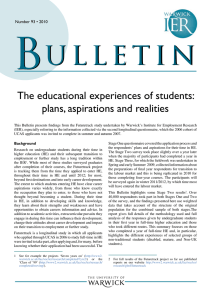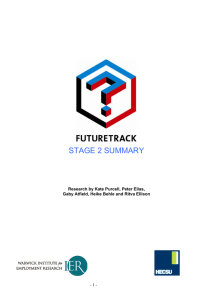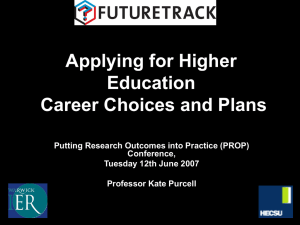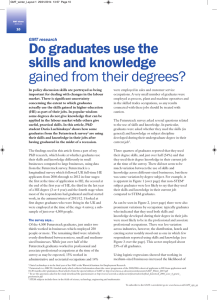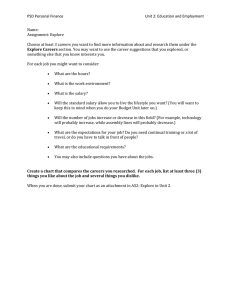FUTURETRACK Some top-level findings from the first Futuretrack Survey of the
advertisement
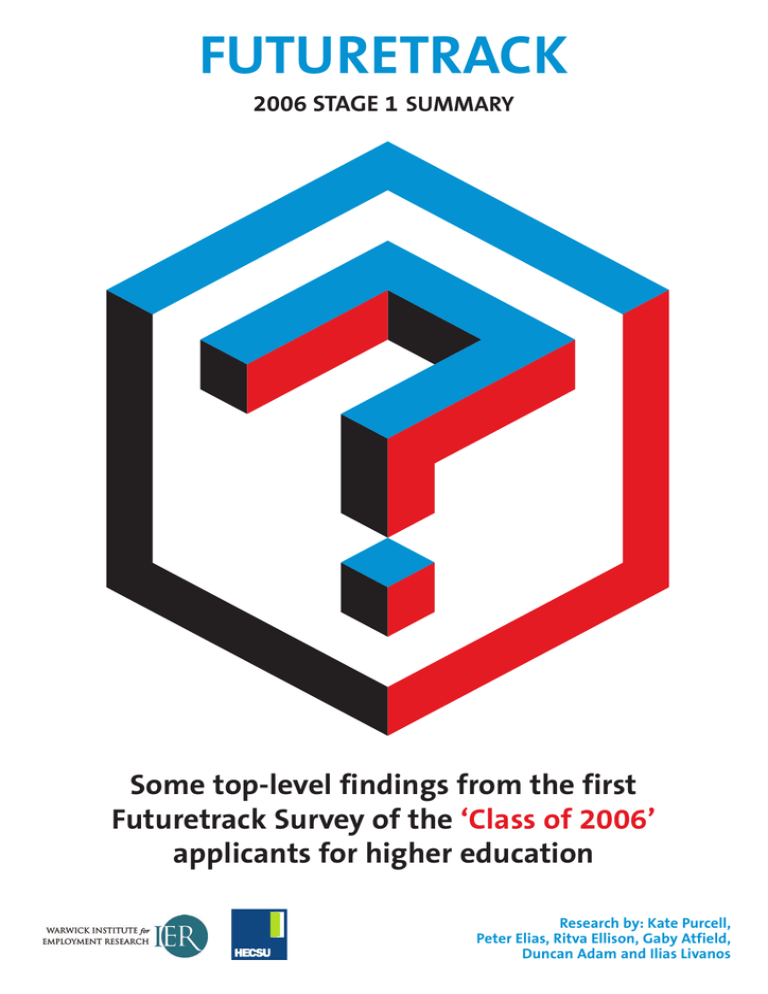
FUTURETRACK 2006 STAGE 1 SUMMARY Some top-level findings from the first Futuretrack Survey of the ‘Class of 2006’ applicants for higher education Research by: Kate Purcell, Peter Elias, Ritva Ellison, Gaby Atfield, Duncan Adam and Ilias Livanos FUTURETRACK 2006 STAGE 1 SUMMARY ABOUT FUTURETRACK Dear Colleagues, Futuretrack is the most ambitious - and potentially useful - higher education research ever conducted in the UK. It will assist government, careers advisers and HE staff to provide the best possible information and guidance to students throughout their higher education careers. The findings will contribute significantly to knowledge about the development of career decision-making in students and graduates. In short, we hope that the research will create more opportunities for future students. This policy seminar is intended to stimulate debate about the policy implications of Futuretrack’s findings. You will get the opportunity to: • consider the evidence from Futuretrack in relation to a range of policy themes in HE • discuss the research focus of Futuretrack stages three and four • make recommendations for action. The first stage of the Futuretrack study has now been analysed by the team at the Warwick Institute of Employment Research (IER). You will find the full report on both the HECSU and IER websites. This brief summary picks out some of the major themes for you to explore. With best wishes, Professor Glynis Breakwell Policy Seminar chair FUTURETRACK 2006 STAGE 1 SUMMARY WHO IS TAKING PART? Every full-time 2006 UCAS applicant was invited to take part in Futuretrack. The ‘first stage’ survey went live in the summer of 2006. Applicants were encouraged to complete the survey, regardless of whether they decided to go into higher education, pursue other options or if they didn’t get the UCAS points to progress further. There were nearly 130,000 useable responses from 277 higher education institutions. Of which: • • • • • 105,000 were in higher education 22,000 doing other things (such as working) 86% were UK applicants 14% were international applicants 80% were aged 21 or under. Futuretrack respondents by region: • • • • • • • Scotland 8% Wales 4% Greater London 12% North East 4% Yorkshire and Humberside 9% North West 7% East Midlands 6% • • • • • • • West Midlands 6% Eastern 4% South East 10% South West 7% Northern Ireland 1% Merseyside 2% Not in a higher education institution 18%. Futuretrack asked the students to rate their written, verbal, numerical and computer skills. It also required the students to evaluate their overall self-confidence. Will these perceptions change over time as the students get older and have different experiences? Does class and race make a difference to the way people view themselves? These are just some of the key themes that Futuretrack will explore. FUTURETRACK 2006 STAGE 1 SUMMARY APPLICATION The first stage of the Futuretrack study looked at the higher education application process in detail. Here are some of the key areas addressed by the study: • the effectiveness of the UCAS process • subjects applied for by gender, race and class • the regional outcome of application • parental background and influence • acceptance rates by socio-economic background. In detail A closer look at the different routes into full-time higher education by ethnicity is an example of the more penetrating Futuretrack investigations contained in the full stage one report. Differences in routes into full-time higher education, by ethnicity Futuretrack shows that the relationship between ethnicity and success in UCAS applications is complex. Different ethnic groups demonstrate different patterns of application, different age profiles and different patterns of subject choice: FUTURETRACK 2006 STAGE 1 SUMMARY • Black and Asian students are more likely to enter university through clearing than white students. • Although there is no evidence of racial discrimination against these groups, some questions remain about the reasons for these differences. • Asian students were the most likely to have applied straight from secondary school, with black students the least likely to have done so. • Black students were also most likely to have applied as further education (FE) students. Some quotes by Futuretrack participants on application: “The application process expects people to make decisions about what they will do with the rest of their life - without knowing if they will be able to do it. If you don't get your grades, you either have to effectively waste a year or accept second best.” Female, History, Yorkshire and Humberside. “All parts of my application process were very helpful and I had the information and access to the people I needed to talk to. My only concern is that I think the application process for the student loan is slow.” Male, Biology, Wales. “The application process needs to be made a lot clearer for those that are not coming through an educational institute. Information regarding fees and loans also needs to be made clearer and the forms that need to be completed need to be made user-friendly.” Female, Business and Administrative Studies, Greater London. “As a rejected medical applicant, I would like to express how the whole application process alienated me for some time: I did not really consider my other options because I was so set on getting into medical school.” Male, Combined Sciences, Scotland. “More information should be given to parents to de-programme traditionalist ways of thinking e.g. Oxbridge or death. I was forced to apply for Cambridge despite my own protests. I failed. As such, I’m now signed up to go to some university I’ve never even visited - when what I really want to do is art foundation.” Female, Linguistics, Classics and Related, Greater London. ATTITUDES TO HIGHER EDUCATION (HE) Futuretrack is exploring students’ attitudes, values and views towards higher education. With tuition fees in place and changing governmental policy, the study will act as important gauge to assess the impact on the modern student. Some of the areas explored include: • is higher education a good investment? • support for student loans by course type and ethnic group • the fear of effect of student debt • the true value of education. In detail The study shows that applicants have highly positive views about the value of higher education. Take a look at the top three responses in the following graph: FUTURETRACK 2006 STAGE 1 SUMMARY • There was remarkably high agreement that students should contribute to the cost of HE if they could afford to – particularly among English students. • EU and overseas students are most convinced about the value of higher education as a whole. • Older applicants are less likely to agree that ‘student loans are a good idea’. Some quotes by Futuretrack participants about higher education: “Education is the key to almost everything in life. Looks, money and family might all be lost, but what you acquire through education stays with you forever. It makes you independent!” Female, Medicine and Dentistry, South East. “Higher education trains the mind and character of an individual.” Male, Combined Sciences, Scotland. “University is a chance to learn, understand, know and search. This is the purpose of life - as life is about developing and exploring. As Kirk would say, 'To boldly go where no man (or woman) has gone!” Male, History, North West. CHOICE MAKING The reasons behind students’ choices are at the core of the Futuretrack project. Some of the key areas explored in the first stage are: • reasons for subject choice by age, socio-economic background, gender and ethnicity • the influence of family • vocational choices. In detail Futuretrack investigated the reasons why first year students chose their HEI: FUTURETRACK • • • • 2006 STAGE 1 SUMMARY Having the right course is the most important reason for choosing a university. Reputation and location are also influential. Many students say that a campus visit swayed their choice. For international students, good university guides and university reputation are deciding factors in choice making. Family background is also an important influence on choice making. • 34% of students whose parents went to university feel their parents had a big influence on their university choice compared with 25% of ‘first-generation’ applicants. • ‘Second generation’ applicants were significantly more likely to decide to enter HE ‘because their friends were doing so.’ • Asian students are more likely to choose an institution because it enabled them to live at home while studying, especially Asian females. • Black students cited less influences on choice of higher education institute (HEI) than other groups - as if HEI was less important to them than choice of course. Reasons for choice of course: FUTURETRACK 2006 STAGE 1 SUMMARY • Enjoying the subject is the main reason students choose their course. However, the study shows that students also see their course as an important stepping stone to their career. • Futuretrack’s initial investigations also reveal that gender and ethnicity are important in the choice of course: education students are predominantly UK females, while Engineering Technologies is male-dominated with a significant amount of overseas (non-EU) participants. • Students from a lower social class were more likely to choose courses for employment reasons. Some quotes from participants about choice making: “More information should be given to school leavers about vocational choices. We are given unreasonable expectations that doing a degree and getting into all this debt will automatically mean you'll get a great job at the end of it.” Male, History, Yorkshire and Humberside. “I feel that students should be encouraged to explore their own paths and especially not to go into HE just because they want the student lifestyle or they have no other idea of what to do.” Female, Linguistics & Classics, East of England. “Having spent the year studying the wrong subject, I have realised how important it is to make a realistic decision on degree choices. I needed more help in deciding obtainable goals.” Female, Social Sciences with Arts, Yorkshire and Humberside. FUNDING AND DEBT There is increasing financial strain on students and their families. Futuretrack asked students about their financial plans and their attitudes to finance and debt. Key areas investigated were: • plans to fund higher education by age and socio-economic background • expectation of debt by background, type of school age and ethnic group • anticipation of doing paid work during term-time. In detail The study asked students how they planned to fund their time in higher education. The following graph is an example of the more in-depth Futuretrack investigations contained in the full report: FUTURETRACK 2006 STAGE 1 SUMMARY Surprisingly, fewer than 20% expect to rely on loans and overdrafts to get through higher education. Will these expectations remain after the study’s second stage? Expectations of debt: • • • • Most students are concerned that their future debt will be a significant issue once they leave university. Socio-economic status made no difference to students’ concerns. Those attending private schools were the least to anticipate significant debts. Scottish Futuretrackers were more likely to anticipate doing paid work to fund their studies – even though they are free from the burden of tuition fees. Student quotes about funding and debt: “Although I know that I will not have to pay back the loan until I earn £15,000, it’s likely to come at a time when I may wish to take out a mortgage on a house etc. This worries me a great deal!” Female, Sciences, South East. “I believe that higher education is a great opportunity for families like mine that are not particularly well-off and could definitely not fund me through university. Support and student loans are the reason why I am able to get a degree.” Female, Education, South East. “Even though the finance may be quite a lot, you'll have your degree forever, which is priceless.” Male, Biology, East. “Education should be free. It is embarrassing that other countries in Europe like France support their students - whereas students in England are made to feel ashamed, a waste of space, as if we do nothing all day.” Female, Medicine and Dentistry, London. FUTURETRACK 2006 STAGE 1 SUMMARY CAREER PLANNING Understanding how students think and plan for their careers is central to the Futuretrack project. The information we collect will be used to help HE careers advisors give better advice. Some of the areas investigated include: • • • • clarity of ideas about career plans prior to course by age/course/sex does university give you better careers options? vocational courses access to careers guidance. Further detail • Most students have a clear idea of what they want to do with their degree. Over 50% have a clear career focus when they join university. • Less than 3% start university having no idea what they want to do with their lives. FUTURETRACK 2006 STAGE 1 SUMMARY Careers guidance pre-HE • Only 35% of school students felt that the careers guidance they received was useful to them. • Black students were most likely to agree that they had excellent careers advice – possibly because they were older when they applied. • Students doing courses lasting more than four years, HNDs or Foundation Degrees were most likely to be vocationally focussed. • Students who perceived their course to be vocational (e.g. medicine) were more likely to have occupationally-focussed career plans. • Age is a factor: the older the student, the more likely they are to be career-focussed. Student quotes about careers guidance: “University is about making new friends and bettering your knowledge – but ultimately it’s about widening your options for your future career.” Female, Education, South West. “A lot of career guidance encourages students to go on to university and study for a degree. A degree is not a suitable career path for everyone.” Female, Physical Sciences, Greater London. “A lot of the information given is aimed at college/6th form leavers…I am a mature student with limited access to careers guidance and found it difficult to find help and support.” Female, Combined Arts, East Midlands. “I feel there is too much pressure on A-level students to chose a career now (i.e. when they finish college). Sometimes taking a bit of time helps decisions become clearer.” Female, Creative Arts and Design, Yorkshire and Humberside. Further information If you want to read the first stage report in full - including information on regional diversity, international students and those Futuretrackers who decided against HE - visit www.hecsu.ac.uk For all Futuretrack student related information, visit www.futuretrack.ac.uk For more information about the Warwick Institute of Employment Research (IER) go to www2.warwick.ac.uk/fac/soc/ier
